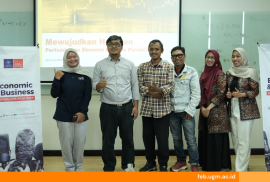The Indonesian government emphasizes sustainability in all sectors, including business. This policy underscores the critical role of business schools in developing innovative and creative leaders to address business challenges in today’s sustainable and digital era.
The Faculty of Economics and Business at Universitas Gadjah Mada (FEB UGM), a business school committed to educating future leaders in economics and business with a focus on sustainability, has launched several initiatives to support this mission. One such initiative is the PKT-GAMABCC 2024: Indonesia Food Sustainability International Competition, in partnership with KAFEGAMA and PT Pupuk Kaltim Persero. This competition provides a platform for learning and mentorship to foster leadership among students across Indonesia.
Integrating Sustainability into the Curriculum
During an exchange session at the PKT-GAMA BCC 2024 opening ceremony, FEB UGM’s Vice Dean for Research, Community Service, Collaboration and Alumni, Gumilang Aryo Sahadewo, S.E., M.A., Ph.D., highlighted the role of business schools in promoting sustainability by integrating it into the curriculum. He shared examples such as FEB UGM’s development of sustainable finance topics within finance courses and the introduction of new classes on circular economy and sustainable supply chains.
He emphasized the need for business schools to incorporate experiential learning activities beyond the classroom. These activities allow students to engage directly with industry players and SMEs to understand business challenges and share their knowledge. “This competition is also a form of experiential learning that explores ways to improve food sustainability in Indonesia. As a business school, we cannot address sustainability issues alone. Collaboration with climate scientists, engineers, healthcare professionals, and other professionals is essential as sustainability issues are far-reaching,” he explained.
Since 2020, FEB UGM has collaborated with the University of Agder and the ASEAN University Network to launch the ASEAN Master in Sustainability Management. It takes a multidisciplinary approach by integrating sustainability courses into the curriculum. A flagship program, the Immersion Program, is part of the Global Summer Week held every July. This program takes students into the field to address real-world challenges SMEs and industries face. As part of the program, students are expected to identify potential solutions, which they present to SMEs and corporations to help develop business activities.
Promoting Research on Sustainability Issues
Another important initiative of the FEB UGM is to promote sustainability research involving the academic community. One example is the “Impact Evaluation Study for Supporting Policy Making in Poverty Alleviation,” conducted in collaboration with Elan Satriawan, M.Ec., Ph.D., and Prof. Abhijit Banerjee of MIT. The study evaluates the impact of Indonesia’s conditional cash transfer program (PKH) and electronic food voucher program (BNPT-Sembako) on the livelihoods of poor households in Indonesia.
“This is a smart move to build relationships with industry and government policymakers through research. This research is not only for publication but also to provide feedback and recommendations to the Indonesian government. These studies have been used as evidence for the Indonesian government to improve the PKH and BNPT-Sembako programs,” he explained.
ANGEL Program
Gumilang highlighted that FEB UGM’s sustainability initiatives include the ASEAN Network for Green Entrepreneurship and Leadership (ANGEL) program, which works with ASEAN partners to provide training to raise awareness of environmental sustainability and leadership within the academic community and society. In Indonesia, ANGEL has partnered with Bale Kawruh Community, a community-based organization in Kalasan, Yogyakarta. This collaboration aims to improve the welfare of the local community and implement effective waste management practices at the household and community levels.
In closing, Gumilang advised the students to prepare themselves to become resilient future leaders equipped with technology, creativity, and problem-solving skills to enter the workforce. “As times evolve and are increasingly driven by artificial intelligence, critical thinking and other soft skills will become even more important. Such skills cannot be replaced by AI and remain key assets for those who want to excel in the future,” he concluded.
Earlier, PKT-GAMABCC 2024 Program Coordinator Eddiwan Danusaputro expressed great hope that the competition will enable students to make a tangible contribution to society. In addition, it aims to foster closer ties with industries and SMEs through the case studies provided.
“We are proud to reach a global audience with this competition. This competition is not just about finding a winner; it’s about finding solutions that can be implemented and make a real contribution to solving problems in Indonesia,” he said.
Reportage: Shofi Hawa Anjani
Editor: Kurnia Ekaptiningrum
Sustainable Development Goals













